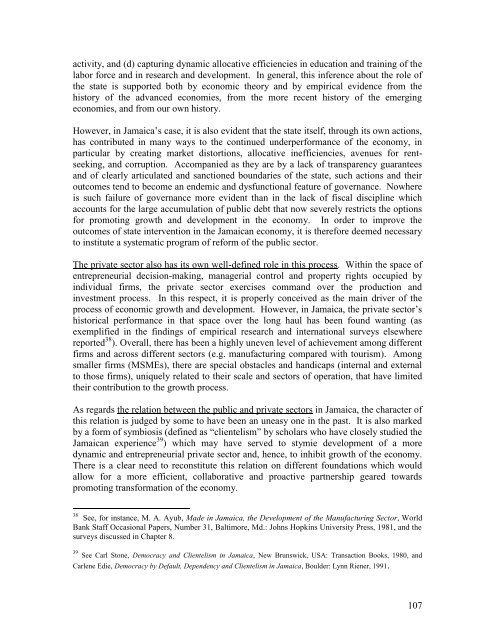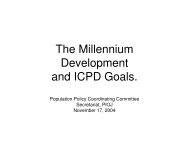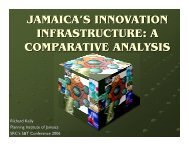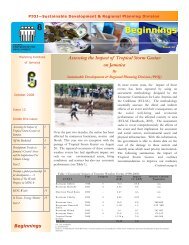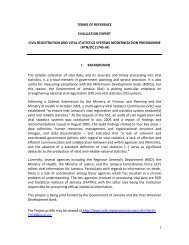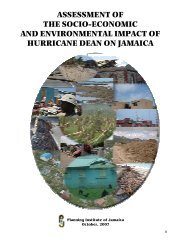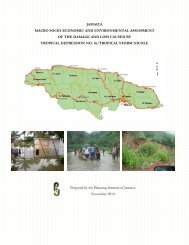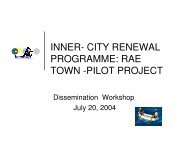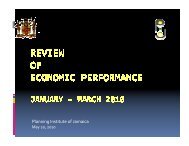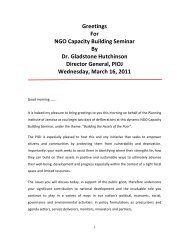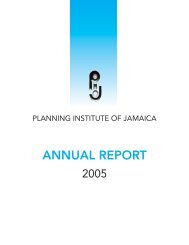PIOJ Growth-Inducement Strategy - Planning Institute of Jamaica
PIOJ Growth-Inducement Strategy - Planning Institute of Jamaica
PIOJ Growth-Inducement Strategy - Planning Institute of Jamaica
You also want an ePaper? Increase the reach of your titles
YUMPU automatically turns print PDFs into web optimized ePapers that Google loves.
activity, and (d) capturing dynamic allocative efficiencies in education and training <strong>of</strong> the<br />
labor force and in research and development. In general, this inference about the role <strong>of</strong><br />
the state is supported both by economic theory and by empirical evidence from the<br />
history <strong>of</strong> the advanced economies, from the more recent history <strong>of</strong> the emerging<br />
economies, and from our own history.<br />
However, in <strong>Jamaica</strong>’s case, it is also evident that the state itself, through its own actions,<br />
has contributed in many ways to the continued underperformance <strong>of</strong> the economy, in<br />
particular by creating market distortions, allocative inefficiencies, avenues for rentseeking,<br />
and corruption. Accompanied as they are by a lack <strong>of</strong> transparency guarantees<br />
and <strong>of</strong> clearly articulated and sanctioned boundaries <strong>of</strong> the state, such actions and their<br />
outcomes tend to become an endemic and dysfunctional feature <strong>of</strong> governance. Nowhere<br />
is such failure <strong>of</strong> governance more evident than in the lack <strong>of</strong> fiscal discipline which<br />
accounts for the large accumulation <strong>of</strong> public debt that now severely restricts the options<br />
for promoting growth and development in the economy. In order to improve the<br />
outcomes <strong>of</strong> state intervention in the <strong>Jamaica</strong>n economy, it is therefore deemed necessary<br />
to institute a systematic program <strong>of</strong> reform <strong>of</strong> the public sector.<br />
The private sector also has its own well-defined role in this process. Within the space <strong>of</strong><br />
entrepreneurial decision-making, managerial control and property rights occupied by<br />
individual firms, the private sector exercises command over the production and<br />
investment process. In this respect, it is properly conceived as the main driver <strong>of</strong> the<br />
process <strong>of</strong> economic growth and development. However, in <strong>Jamaica</strong>, the private sector’s<br />
historical performance in that space over the long haul has been found wanting (as<br />
exemplified in the findings <strong>of</strong> empirical research and international surveys elsewhere<br />
reported 38 ). Overall, there has been a highly uneven level <strong>of</strong> achievement among different<br />
firms and across different sectors (e.g. manufacturing compared with tourism). Among<br />
smaller firms (MSMEs), there are special obstacles and handicaps (internal and external<br />
to those firms), uniquely related to their scale and sectors <strong>of</strong> operation, that have limited<br />
their contribution to the growth process.<br />
As regards the relation between the public and private sectors in <strong>Jamaica</strong>, the character <strong>of</strong><br />
this relation is judged by some to have been an uneasy one in the past. It is also marked<br />
by a form <strong>of</strong> symbiosis (defined as “clientelism” by scholars who have closely studied the<br />
<strong>Jamaica</strong>n experience 39 ) which may have served to stymie development <strong>of</strong> a more<br />
dynamic and entrepreneurial private sector and, hence, to inhibit growth <strong>of</strong> the economy.<br />
There is a clear need to reconstitute this relation on different foundations which would<br />
allow for a more efficient, collaborative and proactive partnership geared towards<br />
promoting transformation <strong>of</strong> the economy.<br />
38 See, for instance, M. A. Ayub, Made in <strong>Jamaica</strong>, the Development <strong>of</strong> the Manufacturing Sector, World<br />
Bank Staff Occasional Papers, Number 31, Baltimore, Md.: Johns Hopkins University Press, 1981, and the<br />
surveys discussed in Chapter 8.<br />
39 See Carl Stone, Democracy and Clientelism in <strong>Jamaica</strong>, New Brunswick, USA: Transaction Books, 1980, and<br />
Carlene Edie, Democracy by Default, Dependency and Clientelism in <strong>Jamaica</strong>, Boulder: Lynn Riener, 1991.<br />
107


